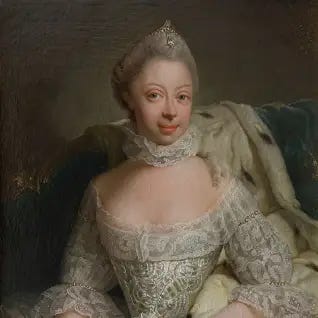Issue #619 Today In Black History, Thursday, May 30, 2024
Please share and subscribe to help us grow this publication.
If you like us, REALLY like us, please click the “Like” button at the end of this post!
Also, please scroll to the end of this post for other ways to financially support us and We Are Speaking with our books and courses.
We appreciate your support!
Today’s Black History WOW!
Queen Charlotte is remembered as one of the most fascinating and influential queens in British history. Born in 1744 in Mecklenburg-Strelitz, Germany, she married King George III in 1761 and became Queen Consort of Great Britain and Ireland. Queen Charlotte was directly descended from Margarita de Castro y Sousa, a Black branch of the Portuguese royal house.
The argument for Queen Charlotte's African ancestry primarily hinges on her genealogy and some contemporary descriptions of her appearance. She was born Sophia Charlotte of Mecklenburg-Strelitz in 1744, and her lineage can be traced back to a Portuguese noble family, the Madragana. Madragana is believed to have been a Moor, a term historically used in Europe to describe Muslims of North African and Berber descent who lived in the Iberian Peninsula.
Historian Mario de Valdes y Cocom is one of the most notable proponents of the theory of Queen Charlotte's African ancestry. He suggests that Madragana's ancestry, and consequently that of Queen Charlotte, included African roots. Valdes y Cocom's analysis draws on genealogical records and portraits of Queen Charlotte that, he argues, show features that could be interpreted as African.
Several later paintings of Queen Charlotte deliberately downplayed her African/mulatto features.
Charlotte was the Queen of Great Britain and Ireland. As George's wife, she was also Electress of Hanover until becoming Queen of Hanover on 12 October 1814. Charlotte was Britain's longest-serving queen consort, serving for 57 years and 70 days. She was also the second-longest consort in British history, after Prince Philip, the husband of Queen Elizabeth II.
Queen Charlotte was also a prominent supporter of the arts and sciences, establishing the Royal Academy of Arts and the Royal College of Music. Her patronage of artists and musicians helped to foster a vibrant cultural scene in London during her reign.
Queen Charlotte's potential African ancestry has gained renewed interest and discussion in recent years, particularly in popular culture. For instance, the Netflix series "Bridgerton" portrays Queen Charlotte as a woman of mixed race, bringing this historical debate to a wider audience.
Queen Sofia Charlotte, the grandmother of Queen Victoria, died on November 17, 1818.
It is highly unlikely that her husband, King George III, ever knew of her death; he died blind, deaf, lame, and insane 14 months later.
Today In Black History
In 1822, three slaves betrayed Denmark Vesey, the planner of the largest slave rebellion to date. Vesey was soon captured and executed by hanging along with 34 others.
In 1854, the Kansas-Nebraska Act repealed the Missouri Compromise and opened the Northern Territories of Kansas and Nebraska to slavery.
In 1965, Vivian Malone became the 1st Black student to graduate from the University of Alabama.
In 1997, Betty Shabazz, widow of Malcolm X, was set on fire by her 12-year-old grandson, Malcolm Shabazz. She suffered burns over 80% of her body and died three weeks later on June 23, 1997. Malcolm Shabazz served 18 months in juvenile detention for manslaughter and arson.
Our paid subscribers are encouraged to discuss this post in our W.A.S. Chat Community.
You are also welcome to view “We Are Speaking” in Substack Notes. You can also read other Substack publications without subscribing to them when you join Notes.
This post is free to read. To have access 365/24/7 to our full archive, comment on our posts, and financially support “We Are Speaking” for no more than $5 per month, please subscribe at the paid level.








